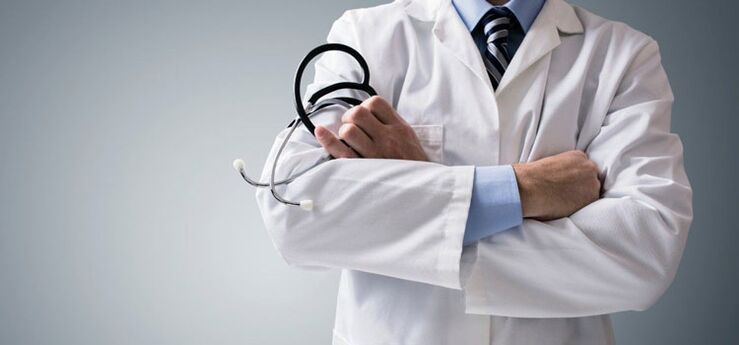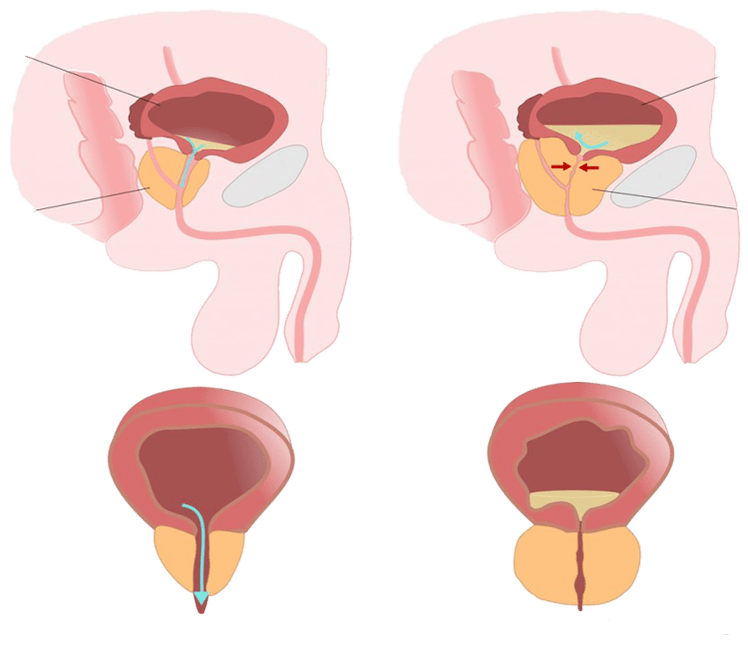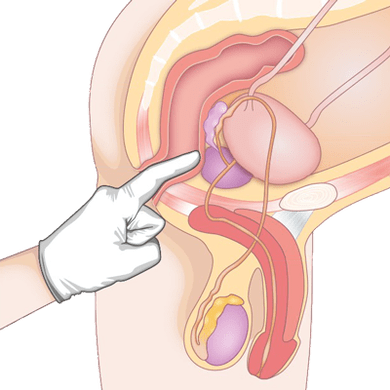
Diseases of the male urogenital system are difficult to treat and are recurrent. Prostate pathologies affect hormone levels, emotional state, erection and urinary tract functions.
In men, the treatment of prostatitis is complicated by the fact that in the early stages of development, disorders practically do not manifest themselves symptomatically. The first symptoms appear as the disease progresses. Early diagnosis and properly prescribed therapy are the keys to a favorable prognosis in the fight against pathology.
What is prostatitis
With a few exceptions, the term "prostatitis" refers to chronic or acute inflammation of the prostate. In men, the manifestations of prostatitis are similar to the symptoms of other pathologies of the urogenital system. The process leads to the blockage of glandular tissue and the appearance of the following disorders:
- Dysuric disorders.
- Decreased sexual desire.
- Erectile dysfunction.
- Pain syndrome.
The disease causes adhesions and scars. Metabolism and blood circulation in the tissues gradually deteriorate. Irreversible changes occur that can only be corrected with surgery. Depending on the etiology and stage of development, there are several types of disorders.
Categories of prostatitis
Inflammation of the prostate matures against the background of pelvic congestion. The process quickly becomes chronic. The favorable time for treatment is the early stage of the disease.
Medical manuals describe 4 types of the disease with characteristic symptoms and manifestations:
- Category I—
Acute prostatitis. The catalyst is tissue infection, gland injury and hypothermia. The inflammation appears suddenly and lasts for 3-4 days. Without the necessary therapy, it becomes chronic. Manifestations:- heat,
- fever,
- pain in the pelvis and lumbar region,
- body poisoning.
- II. category—
Chronic bacterial prostatitis. It starts with an exacerbation. Cause of appearance: interrupted antibiotic course, self-medication. The inflammation occurs in a latent form, without visible manifestations, until the immune system weakens so much that the infection causes the disease to worsen. Treatment begins with antibiotics and NSAIDs. - III. category—
Chronic prostatitis/chronic pelvic pain syndrome (CP/CPPS). Mutated disease due to acute inflammation of the prostate. Disturbances develop slowly, irreversible changes occur, which lead to tissue blockage. Stagnant inflammation, on the other hand, is divided into two subgroups:Category IIIa – Chronic prostatitis/chronic pelvic pain syndrome with signs of inflammation. It is characterized by pronounced manifestations: low-grade fever, which rises to 38-38. 5 ° during exacerbation. Characteristic symptoms of male prostatitis: deterioration of erection, hemospermia, prolonged sexual intercourse without orgasm, urination disorder.Category IIIb – Chronic prostatitis/chronic pelvic pain syndrome without signs of inflammation. In this case, the manifestations are diagnosed exclusively by instrumental research methods.
- ARC. category—
Asymptomatic (asymptomatic) chronic prostatitis. It is considered a poorly understood disease, the etiology of which is not fully understood. Some leading urologists have suggested an age-related cause of the disease. Pathology has no symptoms.

Prostatitis is difficult to cure even in its early stages. In order to achieve a stable remission, it is necessary to eliminate the causes - catalysts, to cope with the arising complications and consequences.
Why is prostatitis dangerous?
Inflammation of the prostate is a serious pathology that affects men's health. Possible complications and consequences of the disease:

- erectile dysfunction- scars and adhesions, the result of inflammation, prevent normal blood flow in cavernous vessels. At the same time, the prostate's ability to process testosterone deteriorates. Sexual desire decreases. During the acute period, friction and ejaculation cause pain. All of the above cause erectile dysfunction. In some cases, complete sexual impotence is diagnosed.
- Infertility- chronic inflammation affects not only the prostate, but also spreads to adjacent parts and organs of the urinary system. Degenerative disorders often occur in the ligaments: testes + glandular tissues. The quality and quantity of spermatogenesis deteriorates. Pregnancy from a man with advanced prostatitis is problematic.
- Development of associated diseases- the inflammation can spread to the adjacent organs of the urinary system:
- urethral canal,
- bladder,
- kidney,
- scrotum
- Death— there is a risk of death in case of purulent disease. If the treatment of acute male prostatitis is not started in time, and purulent formations appear that develop into abscesses, the patient's life is in danger. A ruptured cavity towards the rectum leads to general poisoning and may even cause death.
In severe cases, surgical intervention is necessary. Unlike adenoma or malignant hyperplasia, surgery is prescribed extremely rarely and does not guarantee prevention of relapse.
Which doctor treats prostatitis
It all depends on the manifestations of the disease. The urologist remains the main one. This specialist deals with pathologies of the male urogenital system, including inflammation of the prostate. In the case of certain legal violations, it will be necessary to involve other specialist doctors.

Current clinical guidelines indicate the need to promote:
- Psychiatrist- help is needed if pain and other manifestations cause psychological rejection of sexual relations, impotence without physical disturbances.
- Immunologist— long-term antibacterial and drug therapy takes a heavy toll on the body. Defense functions and resistance to infections decrease. Some forms of prostatitis begin with autoimmune diseases. In all such situations, the help of an immunologist will be needed.
- Surgeon— the opening of purulent abscesses, the performance of TUR, the removal of the prostate, and the removal of calcifications are performed by a specialist. A surgeon will be needed to remove adhesions from the vas deferens and restore reproductive function.
Such a number of specialists required for the complete recovery of the patient convincingly proves that it is impossible to cure prostatitis on your own, and even less to get rid of complications. Professional help is needed.
How to recognize prostatitis
The insidiousness of the disease lies in the fact that the inflammation develops asymptomatically for a long time, in a latent form. The first signs of prostatitis are often attributed to the following: fatigue, radiculitis, diseases of the urogenital system. The pain goes away after taking an analgesic or antispasmodic pill. But inflammation of the prostate lasts until the disorders become global. A man goes to the doctor, where he receives an unpleasant diagnosis.
Still, the most effective way to get rid of prostatitis is early diagnosis and prompt treatment. The chance of a complete recovery is about 80%.
To distinguish between inflammation and other diseases, a number of diagnostic tests are performed:

- Rectal method- the doctor examines the structure of the gland by placing a finger in the anus, which allows identifying possible abnormalities and deviations.
- Ultrasound and TRUS— Due to the low cost and availability of ultrasound diagnostics, it remains the standard of research. The monitor shows the loose structure of the gland, which indicates inflammation, and other signs of calcification and prostatitis can be detected.
- Clinical and biochemical examination of blood and urine- show the presence of inflammation and identify the infectious agent.
- Spermogram- decrease in sperm viability and speed, characteristic signs of congestive prostatitis and blockage of glandular tissue. During an infectious disease, bacteria and pathogens are found in the ejaculate.
- MRI and PET-CT- the most reliable diagnostic methods. Due to the high costs, an examination is only prescribed if the results of previously performed examinations are not clear, and if cancer is suspected.
Tomography reveals signs of the early stage of prostatitis, which cannot be reached with other diagnostic methods. If abnormalities in the functioning of the prostate are suspected, MRI remains the preferred instrumental examination.
How long does the treatment last?
Stories of miraculous deliverance within a few days are nothing more than fairy tales. There is no quick way to treat prostatitis. After the inflammation is diagnosed, long-term therapy and a radical change in eating habits and lifestyle must be adjusted. Only in this case can the disease be overcome.
Modern and effective methods of treating prostatitis have made it possible to shorten the duration of therapy. With an integrated approach, a significant improvement can be achieved within 2-3 months.
Doctors have learned to cope with the consequences of prostatitis. Unique therapeutic methods help to eliminate infertility, restore normal erection and increase sexual desire.
After achieving stable remission, he should regularly take herbs, attend physical therapy sessions for prevention, and otherwise maintain men's health.
How is prostatitis treated?
There is no effective pill that will make all unpleasant symptoms go away after taking it. There is also no such miracle drug among traditional medicine. The best methods of treating prostatitis in men are the proven effective integrated approach: drug treatment + physical therapy + non-traditional methods.
Official medicine offers conservative treatment. After completing the course, unpleasant symptoms and negative manifestations of the disease disappear. In the second stage, the task is to eliminate the complications that have arisen.
Advanced non-invasive methods have increased the chance of a favorable outcome of the disease. Surgery is required in no more than 10-15% of cases.
With the help of drugs
The goal of conservative therapy is to eliminate symptoms. The following drug groups are prescribed:

- NSAIDs- relieves inflammation, heat and fever. They have a mild pain-relieving effect. When prostatitis begins, short-term treatment with anti-inflammatory drugs and vitamins is needed to maintain the normal condition of the gland. Medicines are available in the form of suppositories, tablets and injections.
- Antibiotics- designed to eliminate infectious or bacteriological inflammatory factors. The treatment regimen for prostatitis is prescribed after identifying the causative agent and testing resistance to antibiotics. The duration of the treatment is 7-10 days. In severe cases, the therapy is extended to two weeks.
- Hormones- recommended if the usual medical treatment did not bring any benefit, as well as in case of a decrease in sexual desire due to an advanced disease. Hormonal treatment is prohibited in the early stages. Medicines are taken under the strict supervision of a urologist.
- Symptomatic drugs- take acetylsalicylic acid tablets to relieve the pain. Spasms are removed by an antispasmodic. Blockade with anesthetic is recommended in case of persistent intense pain.
- Vitaminsand medications that maintain prostate function. During the period of remission, it is recommended to take medicines that normalize the metabolism, improve the blood supply of the glandular tissues and the production of juice. Herbal medicines are prescribed for this purpose. In order to strengthen the immune system, a complex of vitamins and minerals is recommended.
Self-medication is dangerous and does more harm than good. Consult a urologist before using any of the above medications.
Application of physiotherapy
Prostatitis is characterized by extensive congestion in the pelvic area, which significantly complicates therapy. Taking medicines proves to be ineffective, as the active components simply cannot be delivered by the blood vessels to the prostate gland.
In order to increase the effectiveness of drug therapy, physiotherapy is included in the treatment of prostatitis in men immediately after the exacerbation subsides.
In addition to traditional electrophoresis, the following techniques are prescribed:
- UHF and microwave.
- Magnetotherapy.
- Mud therapy.
- Plating.
- Ultraphonophoresis.
- Laser treatment.
- Heat therapy.
Most of the listed procedures are included in the complex of techniques used in spa treatment. Contraindications to physiotherapy still exist: acute inflammatory period, development of cancerous tumors, individual intolerance of the patient.
Natural remedies
Modern methods of treating prostatitis increasingly combine official methods with alternative medicine. In ancient times, our ancestors treated prostatitis with herbal infusions, decoctions and beekeeping products. The disease itself did not go away, but the unpleasant symptoms subsided.
Some methods have survived to this day:
- Apitherapy— bee products are used to eliminate inflammation and strengthen the immune system. Honey is a natural antibiotic. Used in treatment: death, propolis, wax, pollen, poison. Poultry and honey massage, tinctures are prepared.
- Medicinal plant collections- urological compounds are sold in pharmacies and you can prepare them yourself. Herbs treat urinary tract disorders, relieve inflammation and relieve pain. Some plants are good antiseptics. Decoctions and teas are made from the collections, which are added when making compotes and tinctures.
In the past, there were no hospitals and pharmacies. The diseases were treated with the help of the gifts of "mother nature". After prescribing the medicinal course, the urologist will definitely recommend a prescription for one of the alternative remedies: herbal medicine or apitherapy.

Only an integrated approach to the fight against prostatitis will help to get rid of the disease once and for all. The success of treatment depends on early diagnosis and careful adherence to the urologist's recommendations.























